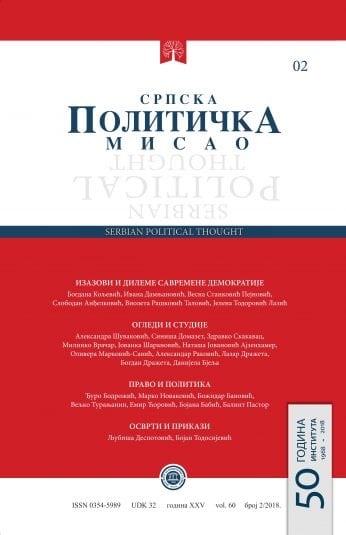Политике наративне конструкције Балкана и балканизма
Politics of Narrative Construction of Balkan and Balkanism
Author(s): Đorđe S. StojanovićSubject(s): International relations/trade, Inter-Ethnic Relations, Geopolitics, Politics and Identity
Published by: Институт за политичке студије
Keywords: Balkans; Balkanisation; Balkanism; Orientalism; Оrientalisation; Post-colonialism
Summary/Abstract: The centrality of the Balkan issue has, during the last thirty years and even before, often been equated with extreme political contexts – armed conflicts. The most common explication of this state of af fairs, aside from global international political trends/intereventions is, one-sidedly and shallowly, seen in the alleged inherent aggressive na tionalism, historically rooted and/or transferred by the radicalization of the distinction of tribal/national pasts and in the liminal position of the marginalized and minorized Balkans in between the West and the East. It seems as if the Balkans is in some state of “frozen”, never ended or perpetuated identity-profiled disintegration, violence and antagonisms. However, the liminality in understanding the Balkans need not point to marginality and irrelevance of the “Balkan political gloss/scholia”, which indeed, best and most poignantly articulate the overlapping dis courses that create and reflect it. The constructed, intelligible Balkans as something that is always Other than how it is perceived or self-perceived, as something elu sive and different from the absolutely external and absolutely internal Europe, qualifies as a liminal space that shifts the internal difference towards the intrinsic, internal logic of submissive “enculturation/ac culturation”: external Balkanization becomes internal Balkanism, externally induced/coded identity becomes internal identity prerequisites/ codes. Absurdly enough, the strategy of resistance against Balkaniza tion becomes the strategy of its affirmation. Even the nineteenth centu ry procreation/promotion/ initiation of the meta-narrative clichéing or stereotyping of the text of sidelined and ghettoized Balkans was less the matter of region defined/fixed by geographic/ political borders (un til the 1878 Berlin Congress, the Balkans semantically referred to the Ottoman Empire as European Turkey or Turkey in Europe), and more a matter of third, heterotopian, atopian or representational space of elas tic/variable/fluctuating forms and irreducible meanings. Is it possible to talk about erasing the Balkanizing borders of the Balkans in toto, in a situation when the “old” generic legacy/code scheme/representation of the Balkans as “wild barbarianism” is now replaced/recycled by new linguistic qualifiers/vocabulary/pathology of neo-racist ranking of the Balkans as a West European “poor and primitive” Other (as in the case of EU members Bulgaria, Croatia and Romania)? It is therefore evi dent that Balkanism will not disappear with the incorporation of the Balkans in the EU, but rather lose in its orthodoxy and gain in cultural hybridity. Respecting the fact that the West is only one of the possible cultural semantic networks/matrices of meaning and not the semantic meta network/meta-matrix of civilization per se, as much as the cultural remission of post-coloniality is, on the one hand, an outcome of glo balizing processes and open confrontation with the Euro-centric vector of (neo)colonial prescriptions and proscriptions, there is also a growing need on the other for a steady resistance/collision with the (neo)colonial engagement/text of invasive American power.
Journal: Српска политичка мисао
- Issue Year: 2018
- Issue No: 3
- Page Range: 51-82
- Page Count: 32
- Language: Serbian

